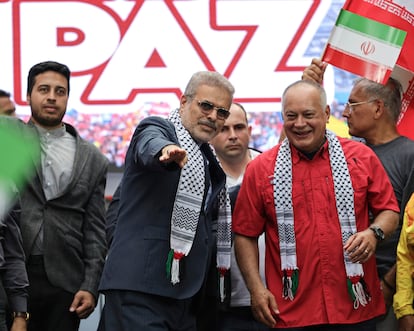A Spanish citizen traveling as a crew member on a Panamanian ship has been arrested in Venezuela.


Venezuelan authorities and Spanish consular sources confirmed this week the arrest of a new Spanish citizen. His identity and the reasons for his arrest have not been disclosed. The detainee was part of the crew of a Panamanian-flagged vessel that was intercepted on the high seas by navy soldiers in Venezuelan territorial waters.
This is the third Spanish citizen detained in the country since the end of 2024. José María Basoa and Andrés Martínez Adasme, both from Bilbao, were arrested on September 14, accused of involvement in terrorist acts aimed at destabilizing the government of Nicolás Maduro. In total, there are 14 political prisoners with Spanish nationality in the country, although the other 11 are Spanish-Venezuelan.
Venezuelan Defense Minister Vladimir Padrino López himself confirmed that this Panamanian-flagged vessel had been detained at the end of June 50 miles off the Venezuelan coast. Local military authorities claimed they were unaware of the true intentions of the vessel and its crew, and therefore decided to place it "in preventive custody." It was reported that two Dutch citizens, a Hungarian, a Panamanian, an Indonesian, and three Honduran nationals were also on board.
The Spanish Ministry of Foreign Affairs also confirmed this latest arrest in a statement issued from Madrid. "The Spanish consular authorities are taking the necessary steps to gather information about a Spanish citizen detained in Venezuela, who was part of the crew of a Panamanian-flagged vessel, in order to provide him with the necessary consular assistance."
The Foreign Ministry has stated that both the General Consultative Office in Caracas and the Spanish Embassy in Panama have been following the case from the beginning. Spanish diplomatic sources in Caracas are manifestly secretive about the matter.
The Bolivarian authorities have remained in a state of permanent alert, known as "Bolivarian fury," since the presidential elections were held on July 29, 2024. This climate of extreme tension is especially palpable in border areas, at roadblocks, and at police and military command posts in rural and urban areas of the country. The announced results of that vote, which granted Nicolás Maduro victory without providing evidence, sparked fierce popular protests, were rejected by the opposition, and questioned by a significant portion of the international community.
Recently, Interior and Justice Minister Diosdado Cabello said the country's intelligence apparatus is working to defuse a new plot allegedly organized by extremist groups to undermine the peace of the municipal elections scheduled for later this month.
Cabello reported that raids have taken place in the states of Zulia, Sucre, Táchira, and the Capital District. The minister alluded to the arrest of a Venezuelan researcher from the University of the Andes, a chemistry professor and petroleum technician, in the state of Mérida. His identity was not revealed. He was presumably planning to provide information to the FBI (the United States Federal Bureau of Investigation) about the presence of Iranian bases in Venezuela. All of this, according to Cabello, "is intended to give substance to María Corina Machado's rhetoric and seek to provoke attacks against our country."
In the days leading up to the parliamentary and gubernatorial elections last May, there was also a strong wave of repression by the Chavista ruling party, which publicly claimed to be dismantling an ongoing subversive plan designed to disrupt the peace of the referendum. Seventy people were arrested at the time, more than ten of them foreigners.
According to the NGO Foro Penal, of the 895 political prisoners currently held in Venezuela, 72 are foreigners or have foreign nationality. Some of them, according to the organization, "have been able to communicate with their families by phone" in recent months.
EL PAÍS




%3Aformat(jpg)%3Aquality(99)%3Awatermark(f.elconfidencial.com%2Ffile%2Fbae%2Feea%2Ffde%2Fbaeeeafde1b3229287b0c008f7602058.png%2C0%2C275%2C1)%2Ff.elconfidencial.com%2Foriginal%2Faaa%2F43f%2Fc04%2Faaa43fc04c58b7039fe502f7b2a09e5a.jpg&w=1280&q=100)
%3Aformat(jpg)%3Aquality(99)%3Awatermark(f.elconfidencial.com%2Ffile%2Fbae%2Feea%2Ffde%2Fbaeeeafde1b3229287b0c008f7602058.png%2C0%2C275%2C1)%2Ff.elconfidencial.com%2Foriginal%2F19d%2F3b9%2Fb11%2F19d3b9b11ce3f21f297aebaaf0ad7ac2.jpg&w=1280&q=100)